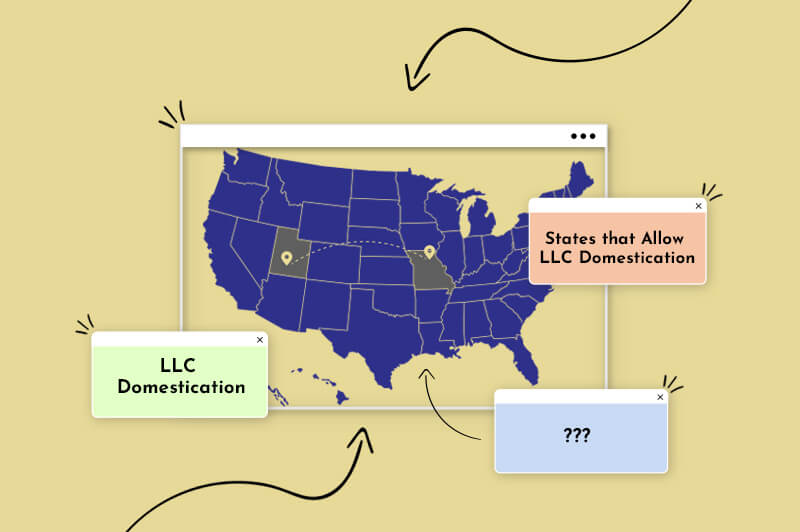Many entrepreneurs choose a limited liability structure (LLC) to launch, manage, and grow their small businesses. And because of an LLC’s flexible nature, it’s an excellent choice.
That flexibility extends to transferring your LLC to another state, whether to be closer to family or to benefit from lower living and business costs such as a state with no franchise tax. Or, taking on a new challenge to expand your business.
Whatever your reason for moving, you must decide how you’ll move your LLC and you’ve got several options to choose from. Some are easier, some harder, and others depend on your reason for moving.
In this post, we’ll explore them and how you get each option done.
Options to Transfer an LLC to Another State

When you change states, you’ve got 4 options with regards to taking your LLC with you. You can:
- Keep your LLC and register it as a foreign LLC in another state
- Transfer your LLC from your state to another, which is known as LLC domestication
- Dissolve your LLC and start a new one
- Merge your existing LLC into a new LLC
Let’s dive into each one to see which is best for you.
Summary of Steps to Transfer an LLC to Another State
- Register as a Foreign LLC
- Obtain a certified copy of your original state’s Articles of Organization
- File the Certificate of Authority in the new state
- Pay the foreign registration and state tax agency fees
- Domesticate (Statutory Conversion)
- Verify the new state allows LLC domestication
- Create and approve a domestication plan with all members
- Get a Certificate of Good Standing from the original state
- File Articles of Domestication (plus any required formation documents)
- Dissolve in the original state
- Dissolve & Re-Form
- Vote to dissolve and settle all debts per your operating agreement
- File Articles of Dissolution and wind up affairs
- Form a new LLC in the destination state by filing its Articles of Organization
- Merge into a New LLC
- Draft and approve a written merger plan between both LLCs
- File Articles of Merger in the new state
- Upon approval, the old LLC dissolves and its assets and liabilities transfer to the new LLC
1. Register it as a foreign LLC
For most business owners, the easiest option for transferring an LLC is to register it as a foreign LLC in their new location. This option comes with a bonus: If you’re not moving home, you can live in your original state and run your LLC in another.
Not sure what a foreign LLC is? No worries, I’ll explain next.
What is a foreign LLC?
A foreign LLC is a legal classification for doing business in another state other than the one you initially registered in. States require businesses to register as a foreign LLC when doing business in their state to ensure they meet their regulatory and tax requirements.
For example, if you formed a California LLC and want to expand to Oregon, you could register as a foreign LLC in Oregon.
How to register as a foreign LLC
- Get a copy of your official LLC articles of organization from your original state
- Fill out the Certificate of Authority in your new state
- Check your application’s accuracy and send it to the new state’s secretary of state’s office
- Pay the foreign LLC registration fee from your business account
- Register your LLC with your new state’s tax agency
Things to consider when registering as a foreign LLC
When you register as a foreign LLC, it means you’re active in 2 states resulting in paying taxes and fees in both.
That’s fine when doing business in both states. Still, suppose you’re only earning in your new one. In that case, it can be costly as some states charge a minimum annual franchise tax ($800 in California, for example) plus other costs, including yearly accountancy filing fees.
If your original state’s annual fees are too expensive to maintain 2 separate entities, keep reading as we’ll explore your other options next.
2. Transfer the LLC from one state to another
Business owners who are switching states for good can transfer their LLC to a new state, also known as domestication. Not all states allow this, but if yours does, it’s an easy option for you and your LLC.
LLC domestication
LLC domestication enables you to move your LLC from one state to another and run your business as if formed in that state. Once the transfer is complete, the laws and fees of your original state no longer apply and your new state will govern your business.
How to domesticate your LLC
The domestication process varies from state to state; you can determine the steps by contacting your chosen location’s secretary of state’s office. However, usually, you’ll need to do the following:

- Draft your plan for domestication
- Multi-member LLCs must gain approval from all owners
- Get a certificate of good standing from your original state
- File the new state certificate and articles of domestication
- Dissolve your LLC in your old state
States that allow LLC domestication
- Arizona
- California
- Colorado
- Delaware
- District of Columbia
- Florida
- Idaho
- Indiana
- Kansas
- Kentucky
- Louisiana
- Massachusetts
- Maine
- Mississippi
- Nebraska
- New Hampshire
- Nevada
- Pennsylvania
- South Carolina
- South Dakota
- Texas
- Utah
- Virginia
- Washington State
- Wisconsin
- Wyoming
Domestication is a straightforward process for moving your LLC, but it might not be possible in your new state. If that’s the case, your next option is to dissolve your LLC and create a new one.
3. Dissolve your LLC and create a new one
Few business owners want to dissolve a successful LLC. Still, it’s an alternative option when domestication and registering a foreign LLC aren’t possible.
Dissolving your original LLC and creating a new one requires more work, but it gives you a clean start. It can be a positive thing for some business owners switching states for good.
How to dissolve an LLC and open a new one
As with most LLC rules, LLC dissolution rules vary from state to state and how you’ve structured your business. Because of this, your first step is to review your original operating agreement and articles of organization as one or the other will contain the rules for dissolving your LLC.
For multi-member LLCs, all members must vote in agreement on the resolution to dissolve. For all LLC types, make sure you know and follow your present LLCs state’s dissolution rules and requirements.
That said, in most states when you dissolve your current LLC you must:
- Stop all business trading
- Pay off all business debts
- Distribute all remaining assets to any members (owners)
- File your dissolution paperwork with your state (depending on your state, you might need an accountant to do this for you)
To summarize, this post has covered what branding is, why it’s important, best practices, examples of brands doing it right, and the various elements that go into a brand. Now you should be well-equipped to start branding your clothing line!
The original LLC members can then form a new LLC in the new state.
4. Merge your LLC with a new one

Most states allow you to merge one LLC into another. While this option applies to more advanced businesses, it can be helpful if the other 3 options don’t suit your needs.
How to merge LLCs
You’ve probably guessed by now that I’m going to tell you that rules about merging vary from state to state. You will, however, need to comply with the state of the LLC you’re merging with, which typically means:
- Draw up your written merger plan
- Have all members from both LLCs vote and agree upon the merger
- File your articles of merger with the secretary of state’s office where you’re forming the new LLC
What happens next?
Once you file an article of merger, it dissolves your old LLC and merges it into the new one. All property of your old LLC becomes the new LLC’s ownership, which handles any debts and liabilities.
Regarding federal income tax, a merger of 2 LLCs is tax-free, providing the merging LLC’s members keep a minimum of a 50% capital interest in the new LLC.
Conclusion
The LLC structure exists to enable entrepreneurs like you to start a business without the fuss of a corporation while benefiting from the limited liability it offers. That ease of use continues when transferring your LLC to another state.
Together they make the LLC structure an attractive option for many small business owners looking to start, grow, and expand their business.
